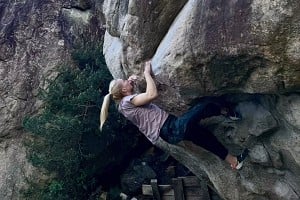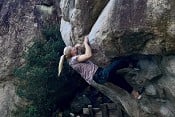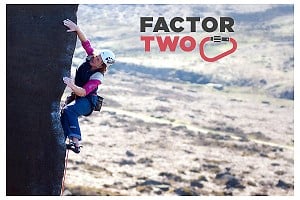
Hey!
I'll probably re-open this topic for at least the 4th time: I've recently (3 weeks ago) completely torn my ACL, sprained my MCL, and potentially did some minor damage to my meniscus. I've started physio, my knee does not hurt, there still some effusion and I still walk a bit unnatural with the affected foot (although I have almost full Range of Motion statically/on the floor). My knee feels stable (although my brain does not yet fully trust it - I used to do cycling and running and probably it helps with the current stability level). Before the MRI and in A&E both orthopedist thought I only had an inflamed tendon after hitting a hold while falling.
My orthopedist recommended to wait for another 4 weeks of physio before making a decision about operation, and he was also recommending me to try to manage it without ACLR as climbing and other sports should be manageable.
For now I plan to stick to no-op (and see how far I can get). I'm curious around other's people experience: both op and no-op and climbing. For no-op I'm curious what levels do you get to climb and with what frequency? What's your experience with re-injury (being the biggest concern in the no-op scenario, looks like there's a higher probability to destroy more stuff in the knee)?
And in terms of surgery I'm especially curious if anyone had experience with ACL repair ( as opposed to reconstruction) and BEAR?
(FWIW before the accident I probably could rope climbing ~7a, boulder V5-6, 3 times a week)
Thanks
This isn’t personal experience but a close friend had ACL reconstruction (hamstring as donor I believe) he was a fairly handy fell runner before so had it as he wanted to get back to it, that hasn’t happened, I’m not sure if he knew that beforehand he would have put himself through it, I think it needs careful consideration of the pros and cons and what it is you want to get back to afterwards, sounds like your consultant is a good one and is guiding you to the end game?
I completely ruptured my ACL in a fall with associated damage like you. I had reconstruction and did not hesitate. Hamstring first time which failed a couple of years later but quad-patella reconstruction worked a treat and now back to the odd 7c and V8... without it I'd never have been able to egyptian, boulder or fall off again... my lower leg was completely independent of the upper leg and running was also impossible.
it's a tough and long road to full recovery but stick to the physio and you'll be good as new 👍
I had ACL reconstruction after rupture a good few years ago and my experience has been pretty positive. I'd say I've never been fitter than post re-hab (I had a very good physio used to working with pro athletes) and never had any problems since. Back when I was pondering surgery/no-surgery it seemed overal feeling was that surgery was better for long term outcome (2007 or there abouts). Physio and surgeon / consultant were both pretty certain that surgery would be better for me. From memory it was more about stability than strength. 2 friends (skiers rather than climbers) who have also had surgery have both were back skiing to the same (disgustingly) high level. To give an idea of timelines, I ruptured in Jan, op in March after a bunch of physio etc, and back climbing in alps in September with no issues. I think it was May when I did my first post op proper rough terrain hill walk. I was climbing outdoors from about June I think.
I don't think you'll get a definitive answer unfortunate - good luck!
I've pinged a friend who raptured his several years ago, took the no-op plus physio route, and is now a climber, runner and cyclist. Hopefully he'll be up to adding his 5 experience here.
I ruptured my ALC and had a closed meniscus tear from playing rugby around 9 years ago now. I avoided surgery and completed lots of physio ( wasn't a climber at this point). Since have been climbing for the past 7 years, along with keen runner ( on and off road up to marathon distance) and cyclists. There was the odd bit of instability in the first years but never held back my climbing.
I've since had a second meniscus tear from and indoor bouldering fall ( this time a bucket handle tear in the same knee but other meniscus). Tbh this has caused more issues with swelling and soreness ( notable after long hill walk descents) than the acl ever has.
In terms of climbing I climb e2, about 7a sport indoors ( and if I actually tries probably outdoors) and about the same bouldering but don't do that much. The knee is certainly not the limiting factor! I can still do most drop knees and big heel hooks with no issues, most of the time I don't think about.
I could very much be an edge case however, whenever I visit physios I get a very confused reaction as they try and work out how stable it is despite the acl missing. Wishing the OP a speedy recovery!
A few things to keep in mind.
all bodyparts (so MCL,PCL, ACL and meniscus are there for a purpose)
listening for non professional opinions online is stupid. Unless medically and physically all things are equal (they pretty much never are), trying to draw conclusion is like algebra. What is X, when 2+4/X-Z^14=TxY^3… but you don’t know Z,Y, or T either.
If you are re-thinking the experts advice. Get a second opinion (preferably a from a really good sports otrhopede, preferably on that understand also climbing).
for What it’s worth (not much, see above). I sprained my MCL many years ago. Then ruptured completely my ACL and toar my meniscus. Had both fixed, and have since been climbing up to feeble grades of mid f7 boulders, and about the same for sport (when I tie in). For trad, around nordic 6+ OS (E3?). Better than prior to braking them.
post OP recovery took it’s time (a year, due to meniscus suturation) but hasn’t really hold me back. Only certain brutal heelhooks have proven too crammed (boulder).
oh, as for the ”they have their purpose”… If your ACL is not fixed, there is much greater change of wrecking your meniscus. And If parts of the meniscus gets cleaned away, your again with a high risk of getting cartilage damage —> artificial knee and only limited sports Afterwards. A few of my friends are at this stage. One can’t ski or climb anymore. And the other can only do low level climbing.
> all bodyparts (so MCL,PCL, ACL and meniscus are there for a purpose)
My friends Mr Coccyx and Mr Appendix need to get this memo
Whether you will need surgery really depends on genetics, so really no point to get that diagnosed via the net.
About 1/3rd of Europeans are co called "copers" who can get away with a torn ACL just by simple strengthening of the musculature, which is in their case enough to stabilize the knee against the sliding action the ACl prevents. The other 2/3rds are "non copers", who will not sufficiently stabilize their knee without either reconstructive surgery or external support, at least not enough for a return to sports like skiing or judo that put massive sliding loads on the knee joint.
The difference between these groups lies in how a small muscle at the back of the knee (M. popliteus) is recruited into the circuit stabilizing your knee against the loads your ACL was supposed to counteract.
I second waiting for a while until you see how well your knee holds up after you have started rehab and once the swelling from the other injuries has gone down.
When I tore my ACL my sports surgeon would have not operated immediately anyway, and once the pain from the other injuries had subsided I had just as much stability in my injured knee as the other one. The only problem that cropped up was after I had the lower leg in a cast for six weeks for an unrelated injury a couple of years later. Then, I snapped my knee out and back in a couple of times, in particular when tension dropped off (e.g. stopping to collect a ball for a throw in when playing football wearing proper studded boots, no issues during tackles a few socnds earlier...).
This would of course be highly damaging if allowed to continue, so I had another round of physio and strength traininig to get the knee back to stable again.
While that ACL injury effectively ended my active judo career at national level a few months early (PhD work and kids would have sufficed not much later) I continued training and sparring at that level for many more years, same as my colleagues who did have surgery. I also have no issue with secondary arthrosis and continue skiing and mountaineering as before.
Treatment of ACL injuries really has come a long way since the 1980s, just make sure you get it done at some specialist surgery who have as much experience as possible with whatever procedure they use for reconstruction, and follow the rehab physiotherapy absolutely religiously, in particular if you decide to try it without surgery!
It is certainly not the career ending diagnosis for your climbing any more!
CB
D’oh. Never say never. Perhaps should have written all parts in ze knee .
BTW. Interesting tidbit my ortho told me. The weight of your lower leg is enough force to break your ACL. Luckily kind of twisting force is pretty much never generated on normal life. But in downhill skiing (If yer riding in ze back seat) and certain drop knee moves, it is rather easy to generate too much force. Another tidbit is that reconstructed ACL is actually stronger than the one you were born with. But takes time post OP to reach it’s potential.
> all bodyparts (so MCL,PCL, ACL and meniscus are there for a purpose)
This mechanistic view of the 'body-as-engine' ignores a capacity for adaption and compensation which is considerable. I have no PCL in my left knee, it works just fine (bouldering, sport climbing to 7b, long days in the mountains including descending when really tired).
> oh, as for the ”they have their purpose”… If your ACL is not fixed, there is much greater change of wrecking your meniscus. And If parts of the meniscus gets cleaned away, your again with a high risk of getting cartilage damage —> artificial knee and only limited sports Afterwards. A few of my friends are at this stage. One can’t ski or climb anymore. And the other can only do low level climbing.
ACL repaired knees have slightly greater likelihood to need surgical intervention in the subsequent 5 years post repair and low quality evidence that surgically repaired knees are slightly more likely to develop osteoarthritis in the long term (2016 Cochrane review).
Overall, there is no strong evidence that ACL repair/reconstruction gives a better long-term outcome than good rehabilitation (Cochrane review). This conceals a mass of individual results: some people cope well without repair/reconstruction (likely around 50%: Reijman et al 2021) and other people do not. It will include some people who tried to cope without repair but failed and had a repair/reconstruction at a later date. It probably also includes people who had a repair/reconstruction and could have managed very well without.
To the OP:
If I were in your shoes, and knowing only what you have written here, I would give rehabilitation for at least 6 months your best shot: find a good physiotherapist who understands the demands of climbing and work hard at your exercises. This is not guaranteed to work (50% chance of success?) and you may still decide you need an operation. I would not rush to surgery.
I have a professional and personal interest in all this but you should, of course, be guided by people you have examined you and talked through the options with.
While the studies you’re cited do paint a certain picture. What need to be understood, that an average Joe might very well live without and ACL. But pretty much all who really do sports, especially as their living, get it fixed.
that being said, getting good physio before operation really critical for a quick recovery. So if it is just the ACL, then the OP is not in a rush. Now if the meniscus requires sutures (meniscus fixation), the critical timeframe is around a week or less from surgery. If no work on meniscus is needed, or minor trimming then as above, no rush (if at all) and proper physio. Possibly a second opinion from a sport ortopedic surgeon.
Ha! There's always got to be some pedant hasn't there?! I just wish it wasn't me so often!
Interesting you say about how the lower leg's weight alone can rupture an ACL, did you see that 9a Seb Boiun climbed recently where he cracked a rib just by the sheer force of his movement, there wasn't even an impact?! Wouldn't have thought that was possible....
The Reitman study (2021) has return-to-sport as a secondary outcome. There was no difference at two years follow-up between the early surgery and the wait-and-see groups. Most ACL repair/reconstruction research is done on sportspeople because "average Joe" tends not to injure her ACL or get it repaired.
Historically, surgery has been pushed as the only option for sportspeople with ACL deficient knees. Because the employers of professional sportspeople can't afford to wait and see? Because there is money in it for private healthcare? Because "..if your only tool is a hammer..."? Because of the relative status of orthopaedic surgeons and physiotherapists? Or because, prior to recent research it seemed to be necessary?
I'd prefer not to get too specific in advice to the OP, he should be talking to a couple of specialists. However, he did say it was 3 weeks since the injury so he's missed the window for early surgery and so does not appear to be risking much by delaying further. Having potentially unnecessary surgery is a greater risk, in my view.
I’d recommend the OP listens to this post and ignores all the anecdotal view points and some other frankly b*llocks that’s been posted on here.
From someone else with a professional interest in this area and not wanting to go into specifics of your case.
> While the studies you’re cited do paint a certain picture. What need to be understood, that an average Joe might very well live without and ACL. But pretty much all who really do sports, especially as their living, get it fixed.
This is just not true. 2/3 yes, 1/3 no for judo/wrestling, and you can tell who is who after a couple of weeks of physio.
The most famous example is the former Germany goaly Harald Schumacher who played without ACLs for most of his pro career...
CB
> Interesting you say about how the lower leg's weight alone can rupture an ACL, did you see that 9a Seb Boiun climbed recently where he cracked a rib just by the sheer force of his movement, there wasn't even an impact?! Wouldn't have thought that was possible....
Cracking a rib using my own core musculature has happened to me as well. That type of injury is actually more common - at least in wrestling and judo, which have much more core load than climbing - than people would think.
However, a former Japanese judo world champion defended an armlock (where the opponent tries to overextend the elbow using his entire body power, trying to force submission) by curling his arm with his bicep alone. This was even successful until his forearm snapped in half! Complete madness.
CB
I'm now 5 months post-op from an ACL reconstruction + Medial Meniscus Repair + Lateral Meniscus Meniscectomy. This all resulted from a bad landing while running down some stairs, which caused an "Unhappy Triad" injury in March 2020, but due to the extreme delays to surgery, I only had the op in January 2021. This effectively meant I had a 10-month physio-based rehab period before undergoing the op.
The knee definitely feels more stable now than during the latter phases of the initial rehab period so in my case surgery seems to have been a good option. I should add that I had a partial ACL tear from a skiing accident to the same knee 5 years ago so it's hardly a new injury and the surgeon noted that I had a lot of scar tissue in the knee from years of carrying round a poorly healed ACL.
The post-surgical rehab period is long and a bit boring (and I'm only half way through it!) but well worth it for a long term outcome. My key milestones (all dictated by the Physio) have been:
*Weight bearing - 6 weeks
*Easy cycling on Zwift - 7 weeks
*Easy outdoor cycling - 9 weeks
*Back to clipless pedals - 11 weeks
*Green light to train hard on the bike -13 weeks
*Squatting and gym work - 18 weeks
*Gentle jogging - 10 weeks
Climbing hopefully allowed again next month.
I know a lot of skiers (mostly ex-racers) who underwent ACL reconstructions and all got back to the same level by about 9-12 months. The hardest part is learning to trust the new graft even though you know its rock solid.
Hope that helps!
Hey! Thanks for sharing. I'm curious if you know by any chance what is the specific problem that blocked him from getting back to the previous level? And, also, did he followed with the rehab religiously?
I'm asking, since as far as I understand the rate of success is quite high for this kind of surgery (given that rehab is done 100% following the phyisio). Where rate of success means that people are able to get back to close to their previous levels (or very close).
Yes, I'm following up with both my orthopedist and physio, but as well I'm trying to understand the whole possibility space so as to have an informed conversation.
Thanks! The long term out come sounds amazing. I'm curious around the circumstances that led to the hamstring graft breaking? (did you overuse or awkward fall?). And also, since I understand you had the graft a long(er) time ago I'm wondering if you have any issues with osteoarthritis?
Thanks once again, I'm doing my best to stick up to the physio plan. So far it is going surprisingly well.
Hey! Thanks for all the feedback. Yes, I don't expect definitive answers, I want just to understand as much as possible the space of this type of injury so I can have an educated conversation with my orthopedist (and I'm trying to do all the possible research). Also, a big issue related to this is that it is hard to find climbing specific knowledgeable orthopedists (and research for that matter).
Your recovery timeline sounds neat. At the moment, UK lockdown(s) has(ve) prepared me for learning to cope without climbing for longer bouts of time, so I'm comfortable with being away from climbing for some time, and I try to find the positive side in rehab (which is still sport at the end of the day).
Just as a curiosity: What kind of graft did you have? How long ago? And any issues with osteoarthritis (or plans in how to manage it?)?
Thanks once again!
Thank you so much! (the climbing/running/cycling trio of sports I can definitely identify with)
Thanks for the detailed context! Makes sense, I've read a few stories of very successful copers (without surgery), this is pretty impressive.
I think around the no-op scenario the part that scares me the most is what you mentioned around injuring the meniscus. As far as I understand the risk of additional damage to meniscus and/or cartilage which in turn can hasten osteoarthritis is quite high without the ACL (tbh now I don't see myself jumping off boulders, or jumping in general anytime soon). I don't see how I would be able to protect my knee while climbing for the next 20 years (in the end, this time as well I was pretty careful and didn't plan to break my knee).
When you say instability for the first few years is it the knee giving away properly? or something else? Also, what changes (over time) that makes it more stable in the latter part (I thought that it is only downhill or best scenario constant 1 year after accident)? And, lastly, do you constantly do physical preparation targeted towards the stability of the knee?
Did you have any issue with osteoarthritis recently (this is the knee being swollen maybe after hill walking?)?
Thanks so much!
The hamstring graft was broken in an awkward fall boulder hopping with a pad on my back... I hit the pad on a rock and it tipped me sideways which put an awkward load through the knee.
Patella quad graft also included another graft using part of the IT band to add extra support...
No arthritis yet... initial surgery was about 10 years ago...
Hey! Thanks for the context.
I'm not re-thinking the expert advice, I'm actually sticking to the plan, we are going to review progress in a few weeks times and decide upon that. I'm curious around other's people (long term) experience because I want to understand which are the variables that I need to be aware of when having "the" conversation with my orthopedist. The second part is that although my orthopedist understands the basics of climbing, I don't think he has in depth knowledge into climbing and at least for now I couldn't find an orthopedist with specific climbing experience - there's also limited research available for climbers specifically, so I'll either need to find someone with expertise or bridge that gap somehow.
It is encouraging to hear that you made such a good recovery (especially since it seems it is not holding you back).
At the end you've highlighted my main concern: even if I would be able to have a stable knee and do sports (which is unclear at the moment - although as far as I understand I'm doing good progress), I'm worried that accidents will happen again (fatigue, awkward fall, anything) and I would damage my knee even worse (requiring either extra-surgery or starting on osteoarthritis early(er?)).
I'll be honest it concerns me too, I haven't ruled out getting the meniscus operated on in the future, especially in regards to the osteoarthritis. I've not had it looked at recently though.
I wouldn't say it ever gave away properly ( never fallen over even when it wobbled in a boulderfield and heavy rucksack on) but can liken it to feeling like rolling an ankle for a few seconds. Wouldn't say it even hurts or feels swollen afterwards but can be disconcerting. I think the surrounding muscles have just got stronger over time which has further reduced it.
Occasionally I'll do focused exercises for my knee, like squats and lunges, but don't do masses really. When I did as the physio was doing a lot however, and should still probably do more now.
> My friends Mr Coccyx and Mr Appendix need to get this memo
Mr Cynical needs to keep up to date.








